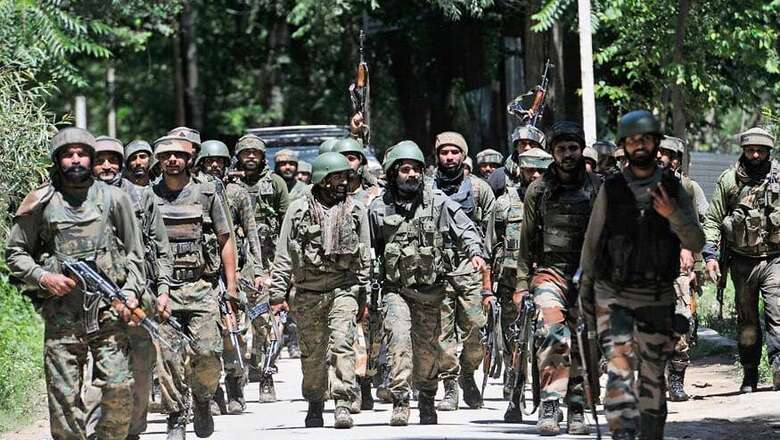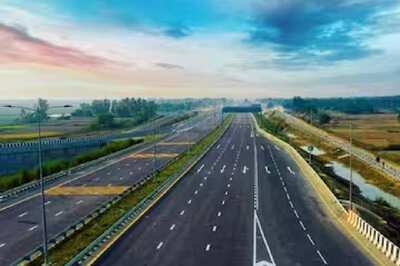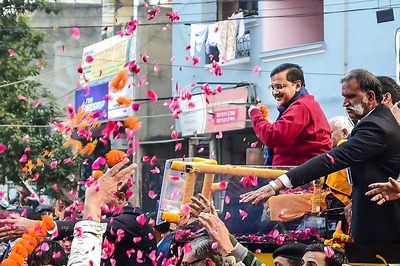
views
Anantnag: After the completion of the first two phases of elections in Jammu and Kashmir, the state now faces the major challenge in south Kashmir which is going for polls on Tuesday.
Consisting of four districts — Anantnag, Kulgam, Pulwama, Shopian — it is for the first time that elections will be held in three phases from a single seat, owing to security reasons. In the first phase, Anantnag district will go for polls tomorrow.
As per the Chief Election Officer, J&K, Shailendra Kumar, “the best possible arrangements have been made” but conducting polls will be an uphill task.
Consisting of sixteen assembly segments, Anantnag parliamentary seat went for polls last time in 2014, wherein 28 per cent voting was recorded. PDP’s Mehboba Mufti was voted to power in the election.
In the assembly election, BJP (25) and PDP (28) got the maximum number of seats. Despite being opposite to each other on some major issues, the PDP and BJP formed an alliance, which was like coming together of north-pole and south-pole.
The first chief minister of the alliance, Mufti Mohammad Sayeed, the patron of PDP, died in January 2016 and his daughter Mehbooba Mufti took over as Chief Minister. But after just a few months, in July 2016 with the killing of Burhan Wani, Kashmir erupted into clashes. Over a hundred people were killed and thousands injured.
Elections could not be held on the seat left vacant by Mehbooba Mufti since then due to the situation. It is for the first time that elections will be held on the Anantnag seat.
During the PDP-BJP rule, the situation in the valley had turned bloody and local militancy witnessed a surge. Since 2016, Kashmir has been in under constant unrest.
In 2018 alone, around 600 people — 159 forces personnel, 267 militants and 160 civilians — were killed.
While gunfights between militants and forces have become a norm, civilians rushing to the encounter spots to support the militants flee is another big concern.
But this is not all Election Commission and the administration is worried about.
After the suicide car-bomb attack on a CRPF convoy, which claimed the life of at least 40 CRPF troopers, at Lethpora in south Kashmir’s Pulwama, on the Srinagar Jammu Highway, the stakes have only increased.
What is the concern this time?
In south Kashmir between 150 and 200 militants are believed to be active.
“The primary concern we are facing this time is the militant presence. With the recent suicide-attack the concern is even higher,” said a top police official.
“We have inputs that militants are planning attacks on the poll days. They want to target, either forces or politicians. This remains a major challenge for us,” the police officer who is engaged in counter-insurgency operations said.
Apart from that, there is also a fear of civilian protests and stone pelting.
Given the rate of violence in the past years, police officials say, there are high chances that separatist mentality people will not only remain away from polls but will try to create disturbances.
The political workers have also been told to remain alarmed given the possibility of a militant attack on them.
“The political activists who are active on the ground can be a soft target for the militants. We have provided security to the main leaders and top activists but the security of village-level party workers remains a concern,” police officials said.
The extra measures taken
Recently additional 10,000 additional paramilitary personnel have been deployed to the valley for elections. As the polls are over in north and central Kashmir, most of the forces have been deployed in south Kashmir.
Most of the additional forces have been deployed to south Kashmir. All the polling booths have been declared as hypersensitive, officials said.
Given the tensions on the ground and the large-looming threat of militants, for the first time, Anti-Riot Groups (ARG) have been formed. The ARG has mainly been set up after the threat of a Pulwama like an attack.
The poll is being held in phases because of the situation.
Anantnag district, as per officials, will go for polls first as the situation is the district is considered to be better than south Kashmir’s other three districts.
“There are around 26 militants active in the district,” said a police official. “Anantnag, which is also the largest district of south Kashmir also seems a mood setter.
“The district is relatively better. If the voter turnout is good and the situation remains calm it will help us in conducting polls in other parts” said a top police official.
In the second phase, Kulgam district will be going for the polls on April 29 and in the third phase two districts, Shopian and Pulwama pols will be going for polls on May 6.
The Anantnag district which is going for polls on tomorrow is spread over 6 Assembly segments—Anantnag, Dooru, Kokernag, Shangus, Bijbehara and Pahalgam and has 529256 electors including 269603 males, 257540 females, besides 11 transgender voters.
The polling will be held in 714 polling stations and 18 candidates, including former chief minister, Mehbooba Mufti, are in the fray.
The first phase of polls is not the only test for the candidates in the fray but for the Election Commission, forces and the administration.


















Comments
0 comment